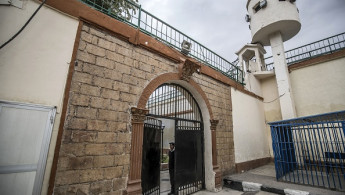Egypt's Sisi pardons journalist, more than 3,000 convicts
Egyptian President Abdel Fattah Al-Sisi has pardoned a journalist who was jailed for "spreading false news", as well as more than 3,000 prisoners, local media and officials said Wednesday.
Hossam Moniss, who is also a prominent leftist organiser, was sentenced to four years' imprisonment in November over the charge, which is frequently levelled against dissidents in Egypt.
Local media reported Moniss's pardon on Wednesday, while Tarek al-Awady, a lawyer and member of the recently re-formed Presidential Pardon Committee, tweeted "congratulations, Hossam Moniss has been pardoned."
The interior ministry said in a later statement that 3,273 prisoners convicted in criminal cases had received presidential pardons.
Moniss was arrested in 2019 along with a number of opposition figures preparing to run for the "Hope Coalition" in 2020 parliamentary elections.
An emergency court convicted Moniss, along with five others including former lawmaker Ziad el-Elaimy -- a prominent figure in Egypt's 2011 revolution who is still in jail -- to between three and five years in prison.
Amnesty International had condemned the sentencings, saying all involved "were subjected to a litany of human rights violations" and "should never have been arrested in the first place".
News of his pardon came just days after 41 political prisoners were ordered released from pre-trial detention, including another "Hope Coalition" activist, Hassan al-Barbary.
Human rights defenders have regularly denounced Egypt's "abysmal" human rights record since Sisi took power in 2013.
Rights groups estimate that some 60,000 political prisoners are being held in Egypt.
Sisi launched a "national strategy" for human rights in September last year, insisting that education, health or electricity are more important than freedom of assembly, which is virtually forbidden in the country.
In November, Egypt will host the COP27 climate summit, a move Human Rights Watch has said "rewards" Sisi's "repressive rule".





 Follow the Middle East's top stories in English at The New Arab on Google News
Follow the Middle East's top stories in English at The New Arab on Google News


